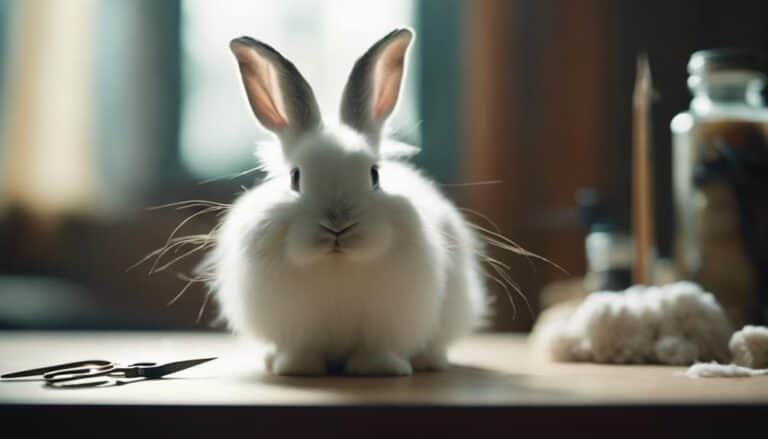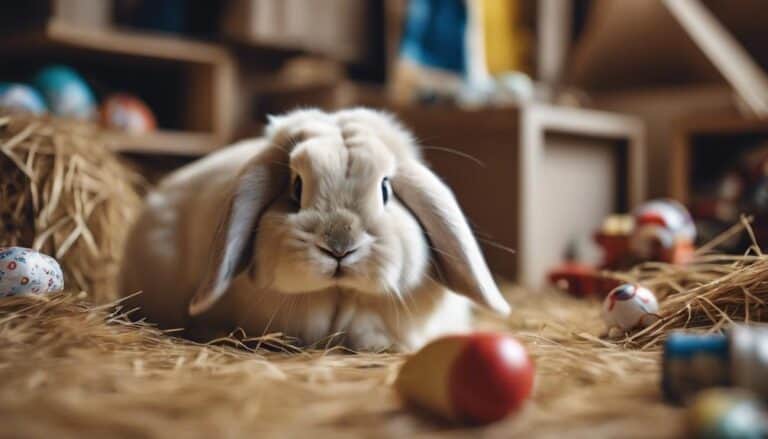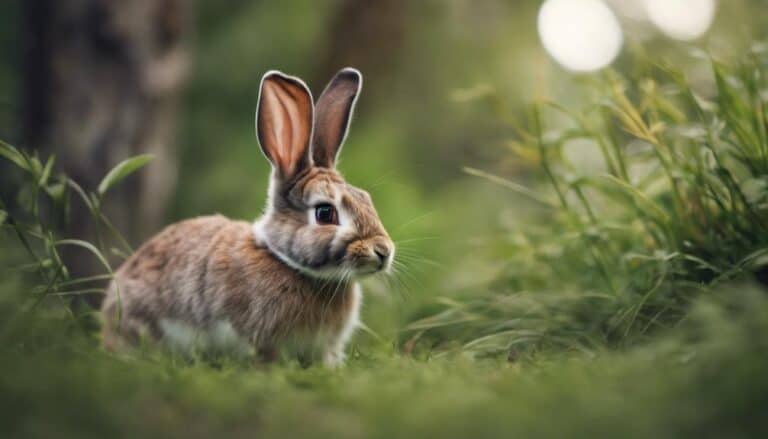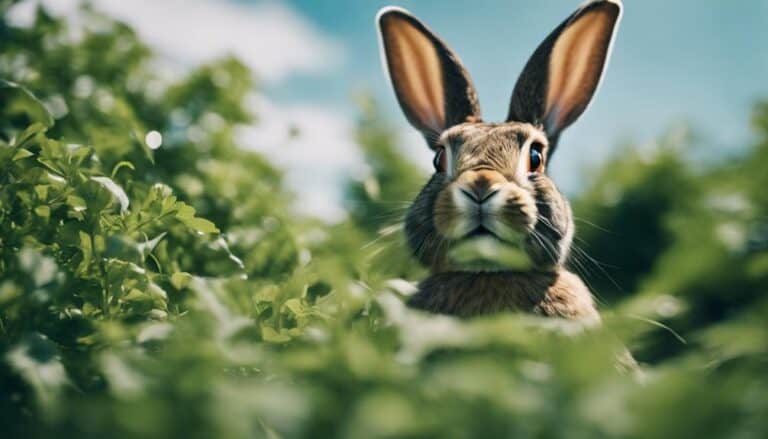Imagine a peaceful evening, the soft rustling of leaves outside, and the gentle hum of a fan in the background. Suddenly, a faint snore breaks the tranquility.
You may wonder, do bunnies snore too? The answer might surprise you. Stay tuned to uncover the truth behind this adorable yet intriguing phenomenon in our furry friends.
Contents
- 1 Key Takeaways
- 2 Snoring in Rabbits: An Overview
- 3 Understanding Rabbit Snoring Sounds
- 4 Factors Contributing to Rabbit Snoring
- 5 Do Bunnies Snore Loudly?
- 6 Health Implications of Rabbit Snoring
- 7 How to Monitor Your Rabbit's Snoring
- 8 Preventing Snoring in Pet Rabbits
- 9 Seeking Veterinary Care for Rabbit Snoring
- 10 Frequently Asked Questions
- 11 Is Snoring Common in Bunnies and Can Eating Chocolate Cause Snoring in Bunnies?
- 12 Conclusion
Key Takeaways
- Rabbit snoring can be caused by nasal obstructions, infections, weight gain, aging, and breed characteristics.
- Monitoring snoring patterns is crucial; seek immediate veterinary attention for distress or changes in breathing sounds.
- Lop-eared breeds are more prone to snoring due to their anatomy and breed-specific characteristics.
- Regular veterinary check-ups, maintaining a healthy weight, and clean living environment help prevent and manage rabbit snoring.
Snoring in Rabbits: An Overview

Snoring in rabbits can be attributed to various factors such as flattened faces in certain breeds, foreign bodies in nasal passages, and subclinical bacterial infections in the lungs. Additionally, breed-related congenital issues, weight gain, and aging can also contribute to snoring in rabbits. Monitoring your rabbits' snoring patterns is vital; while snoring during sleep may be harmless, if accompanied by distress signals, it can indicate an emergency situation that requires immediate veterinary attention for respiratory distress.
To prevent snoring in rabbits, it's essential to keep their nasal passages clear, schedule regular vet check-ups, and make sure they maintain a healthy weight. The severity of snoring in rabbits can vary based on the underlying causes, with emergency cases necessitating prompt veterinary intervention. By staying vigilant and addressing potential issues early on, you can help your rabbits lead healthier and more comfortable lives.
Understanding Rabbit Snoring Sounds
If your bunny makes snoring sounds, it could be due to narrowed or obstructed nasal passages, especially common in breeds like lop-eared rabbits.
Foreign bodies or bacterial infections in their noses can also contribute to snoring. Understanding these causes can help you monitor your rabbit's health and well-being more effectively.
Snoring Behavior in Rabbits
While observing your pet rabbit, you may notice unexpected sounds emanating from its nasal cavities, potentially indicating a snoring behavior that warrants further investigation. Rabbits can indeed snore due to various reasons such as breed characteristics like flattened faces in lop-eared breeds or foreign bodies obstructing their nasal passages.
Bacterial infections, particularly Pasteurella multocida, can also lead to snoring in rabbits. It's essential to take into account respiratory issues, immune system health, and the possibility of congenital problems when addressing snoring behavior in rabbits.
If you observe persistent snoring in your rabbit, seeking veterinary advice is important to identify and address the underlying cause to make sure your furry friend's well-being.
Causes of Rabbit Snoring
When observing your pet rabbit, it becomes important to understand the various factors contributing to rabbit snoring, including breed characteristics, nasal obstructions, infections, weight issues, and aging. Some breeds are more prone to snoring due to breed-related congenital issues, while overweight rabbits may experience snoring from narrowed airways. Additionally, subclinical bacterial infections or aging can lead to respiratory distress and snoring. In emergency situations, if you notice a blue tinge in your rabbit's lips and nose, or nasal obstructions causing distress accompanied by snoring, immediate veterinary attention is vital. Monitoring your rabbit's snoring, especially during sleep, can help spot signs of distress early. Preventive measures like keeping nasal passages clear, regular vet check-ups, and maintaining a healthy weight can aid in averting potential issues.
| Factors | Description |
|---|---|
| Nasal Obstructions | Foreign bodies or narrow passages can cause snoring in rabbits. |
| Subclinical Bacterial Infections | Undetected infections may lead to respiratory issues and snoring. |
| Aging | Older rabbits may experience age-related respiratory changes contributing to snoring. |
Factors Contributing to Rabbit Snoring

Certain factors can contribute to your rabbit snoring, such as their unique anatomy and breed-related issues. The way your bunny sleeps, including their positions, can also affect their snoring patterns.
Additionally, underlying health conditions like infections or being overweight may play a role in your rabbit's snoring habits.
Rabbit Anatomy and Snoring
Rabbit anatomy plays an important role in the phenomenon of snoring among these small mammals. Factors such as narrowed nasal passages, breed characteristics (especially in breeds like lop-eared rabbits), foreign body obstructions, bacterial infections (such as Pasteurella multocida), congenital issues, and being overweight can contribute to snoring.
Certain breeds with flattened faces or unique skull shapes are more prone to snoring due to their anatomical structure. Snoring in rabbits may also stem from subclinical bacterial infections, particularly Pasteurella multocida. Additionally, age-related changes and weight can exacerbate snoring in rabbits.
It's significant to monitor snoring patterns and promptly seek veterinary advice if there are sudden changes or signs of distress to effectively manage rabbit snoring.
Sleep Positions Affecting Snoring
Snoring in rabbits may be influenced by their sleep positions, particularly those that affect airflow and the relaxation of throat muscles. Factors such as body weight, age, and nasal structure can contribute to snoring during sleep in rabbits.
They may snore more when sleeping on their backs or in positions that restrict airflow, impacting the throat muscles' relaxation. Monitoring sleep positions and snoring patterns can help establish any potential discomfort or issues in rabbits.
It's important to contemplate these factors when observing your rabbit's sleep habits to guarantee their well-being and address any snoring concerns promptly. By understanding how sleep positions affect snoring, you can better care for your furry friend and promote their overall health.
Health Conditions and Snoring
Factors contributing to snoring in rabbits include flattened faces and narrow nasal passages in lop-eared breeds, foreign bodies obstructing nasal passages, bacterial infections like Pasteurella multocida, and congenital issues necessitating veterinary attention. If your rabbit is making a snoring noise, it could indicate respiratory distress.
Signs of infection may include nasal discharge, sneezing, or labored breathing. Prompt veterinary advice is vital to diagnose and treat underlying causes. Bacterial infections can weaken a rabbit's immune system, making them more susceptible to snoring and other health issues.
Understanding these causes can help you provide the necessary care to ensure your rabbit's well-being.
Do Bunnies Snore Loudly?

When evaluating the loudness of a bunny's snoring, consider potential breed-related factors such as narrowed nasal passages in lop-eared breeds. Some bunnies may snore loudly due to these anatomical characteristics, which can affect the airflow during breathing.
Additionally, foreign bodies obstructing their nasal passages or bacterial infections like Pasteurella multocida can also contribute to bunnies snoring audibly. It's important to be aware that congenital issues affecting their respiratory system may lead to loud snoring as well.
By monitoring the loudness of your bunny's snoring, you can gain insights into their well-being and potentially uncover underlying health concerns. If you notice persistent loud snoring in your bunny, it might be beneficial to consult with a veterinarian to rule out any serious issues and make sure your furry friend's health is in excellent condition.
Health Implications of Rabbit Snoring
Considering the potential health implications associated with rabbit snoring, it's important to be vigilant for any signs of distress or respiratory issues that may warrant immediate veterinary attention. Snoring in rabbits can be attributed to various factors such as narrowed or blocked nasal passages, breed-related factors, foreign bodies, bacterial infections, or age-related issues.
Monitoring snoring patterns is vital to assess distress, with respiratory distress and cyanosis indicating emergency situations that require prompt veterinary evaluation. While rabbits may snore during sleep, especially if they're overweight or aging, sudden or distressing snoring shouldn't be overlooked.
Emergency signs to watch out for include attempts to breathe through the mouth, a blue tinge in lips and nose, and other indications of respiratory distress. Seeking veterinary advice for snoring rabbits is essential to address potential health concerns promptly and ensure the overall well-being of your beloved furry companions.
How to Monitor Your Rabbit's Snoring

To effectively monitor your rabbit's snoring patterns during sleep, pay close attention to any changes or signs of distress. Keep an eye out for respiratory distress indicators such as difficulty breathing, unusual postures, or changes in behavior. If your rabbit's snoring becomes distressing or is accompanied by concerning symptoms, seek veterinary attention promptly. Regularly inspect your rabbit's nasal passages for any foreign bodies that could be causing snoring issues. Remember, while some snoring in rabbits can be normal during sleep, sudden or distressing snoring may indicate an underlying problem that requires immediate vet care. Below is a table summarizing key points to help you monitor your rabbit's snoring effectively.
| Aspect | Action | Example |
|---|---|---|
| Snoring Frequency | Monitor how often your rabbit snores during sleep | 2-3 times per week |
| Breathing Difficulty | Watch for any signs of labored breathing or struggling to breathe | Rapid, shallow breaths |
| Changes in Behavior | Note any unusual behaviors or patterns accompanying snoring | Lethargy after snoring |
| Veterinary Attention | Seek professional help if snoring is distressing or persists | Visit vet for evaluation |
Preventing Snoring in Pet Rabbits
To prevent snoring in pet rabbits, maintaining clear nasal passages is essential for best respiratory health. Make sure that your rabbit's living space is free of dust, hay particles, or any other potential foreign bodies that could obstruct their nasal passages.
Regularly check and clean their environment to reduce the risk of respiratory infections caused by bacteria or allergens. Additionally, be mindful of your rabbit's weight as obesity can lead to breathing difficulties and an increased likelihood of snoring.
Flat-faced breeds are more prone to snoring due to their anatomical structure, so extra care is needed for these rabbits. Monitor your rabbit's snoring patterns closely and seek veterinary advice if you notice any changes or signs of distress.
Seeking Veterinary Care for Rabbit Snoring
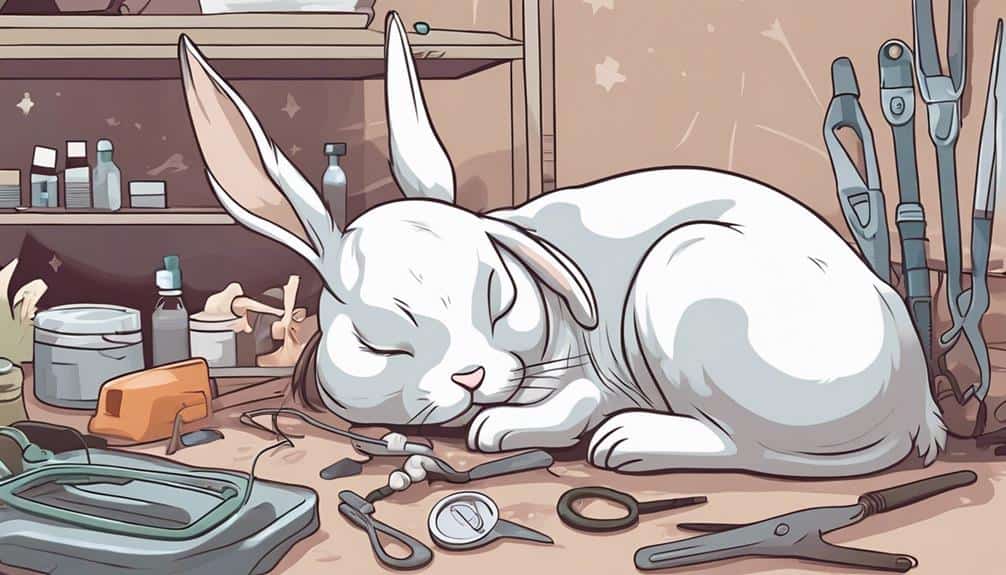
If your rabbit is experiencing snoring accompanied by respiratory distress, agitation, or a bluish tinge in their ears or nose, it's important to seek urgent veterinary attention. Changes in snoring patterns or the presence of distress should prompt you to seek veterinary advice for your rabbit.
While some rabbits may snore only when sleeping, which can be important, overweight or aging rabbits may snore more frequently, indicating a need for veterinary evaluation. Understanding rabbit health and behaviors is critical in recognizing when to seek help for snoring rabbits.
If you notice your rabbit displaying abnormal snoring patterns, especially when combined with signs of respiratory distress, agitation, or a bluish tinge in their ears or nose, don't delay in contacting a veterinarian. Prompt veterinary attention can help address any underlying issues causing the snoring and guarantee the well-being of your beloved pet.
Frequently Asked Questions
Is It Normal for a Rabbit to Snore?
It's normal for rabbits to snore, especially when they're relaxed. Breeds with narrow nasal passages may snore more. Monitor their snoring patterns; sudden changes or distress signs require a vet visit. Snoring in rabbits is like other animals and may not need treatment.
Why Is My Bunny Making Noise While Breathing?
If your bunny is making noise while breathing, it could be due to various reasons like respiratory issues, allergies, or nasal congestion. Monitor their breathing patterns, eating habits, and sleep. Excessive panting or wheezing sounds may signal a problem requiring vet attention.
Why Does My Rabbit Sound Congested?
If your rabbit sounds congested, it could be due to respiratory infections, allergies, or sinus problems. Watch out for breathing difficulties, chronic sneezing, or wheezing. Seek veterinary care to address underlying causes and manage allergies effectively.
What Does Bunny Honking Sound Like?
When bunnies honk, they make short, sharp, and loud sounds like goose honks. Bunny communication includes various vocalizations, like grunts and purring, conveying excitement or warnings. Understanding bunny language helps interpret their behaviors accurately.
Is Snoring Common in Bunnies and Can Eating Chocolate Cause Snoring in Bunnies?
Yes, snoring can be common in bunnies, especially if they have a blockage in their nasal passages. However, there is no scientific evidence to suggest that chocolate consumption can cause snoring in bunnies. It’s best to consult a veterinarian if you notice any unusual behavior in your bunnies.
Conclusion
So, do bunnies snore?
Yes, they can indeed snore for various reasons, which can range from harmless to potentially concerning.
For example, imagine your fluffy bunny peacefully sleeping in their cozy bed, softly snoring away as they dream of hopping through meadows.
Keep an eye on your rabbit's snoring patterns and seek veterinary care if you notice any changes or signs of distress to guarantee their health and well-being.

